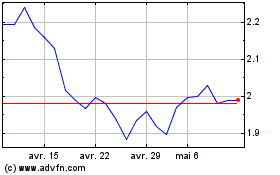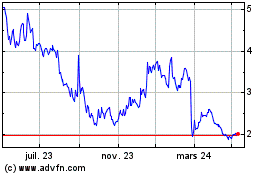PRESS RELEASE
AB SCIENCE RECEIVES NOTICE OF ALLOWANCE
FOR EUROPEAN PATENT COVERING MASITINIB UNTIL 2036 IN THE TREATMENT
OF MASTOCYTOSIS
THIS DECISION FURTHER STRENGTHENS
MASITINIB’S INTELLECTUAL PROPERTY PROTECTION STRATEGY BASED
ON MEDICAL USE
PATENTS
Paris, January 15, 2024, 6pm CET
AB Science SA (Euronext -
FR0010557264 - AB) today announced that the European Patent Office
has issued a Notice of Allowance for a patent relating to methods
of treating severe systemic mastocytosis (i.e. a medical use
patent) with its lead compound masitinib, based on findings from
study AB06006 [1]. This new European patent provides intellectual
property protection for masitinib in this indication until October
2036.
The same medical use patent strategy had been
successfully pursued in amyotrophic lateral sclerosis, with patent
granted worldwide until 2037, and is being pursued in other
indications such as multiple sclerosis, Alzheimer’s disease for
protection until 2041, and in prostate cancer until 2042.
Masitinib is positioned as a treatment of
severely symptomatic systemic mastocytosis patients, including the
subvariants of indolent and smoldering systemic mastocytosis, who
are unresponsive to optimal symptomatic treatment.
The Notice of Allowance (NOA) means that the
European Patent Office intends to grant the patent application,
EP3359195A1, after the completion of certain formal procedural
steps. Once granted, the patent can be kept in force until October
2036. A European NOA is issued after an examiner determines that a
patent application satisfies all requirements for patentability
under the European Patent Convention.
More specifically, this patent provides
protection of masitinib and related compounds for treatment of
systemic mastocytosis in a patient population presenting with at
least two severe mast cell mediator release associated symptoms,
selected from pruritus, flushes or depression (Hamilton rating
scale). This patient population is consistent with results from
masitinib study AB06006 [1] and also the on-going clinical
development program of masitinib in severe systemic
mastocytosis.
“This is good news because it proves once again
that the masitinib platform is protected for a period of between 12
to 17 years depending on the indication, providing enough time to
complete the program until registration and to maximize revenues
during the commercialization phase”, said Alain Moussy, CEO of AB
Science.
Masitinib has previously been granted orphan
drug status in mastocytosis by the FDA and the EMA.
The same medical use patent strategy had been
successfully pursued in amyotrophic lateral sclerosis (ALS), with a
patent relating to with the treatment of ALS with masitinib having
been granted in 14 regions to date: namely, Europe (patent EP
3240538), USA (US 10092564), Canada (CA 3018635), China
(ZL201780019760.9), South Korea (KR 10-2293847), Japan (JP
7250312B2), Israel (IL 261856), Australia (AU M53001274), Eurasia
(EA 201800499), Mexico (MX 390495), Singapore (SG 11201808106Y),
New Zealand (NZ 745778), South Africa (ZA 2018/05810), and Hong
Kong (HK1261581), protecting masitinib until 2037.
Based on the same rationale, medical use patents
have been filed for treating progressive forms of multiple
sclerosis, Alzheimer’s disease, and prostate cancer with masitinib,
which if granted, would protect the use of masitinib in these
indications until 2041 (multiple sclerosis and Alzheimer’s disease)
and 2042 (prostate cancer).
Reference
[1] Lortholary O, Chandesris MO, Bulai Livideanu C, et al.
Masitinib for treatment of severely symptomatic indolent systemic
mastocytosis: a randomised, placebo-controlled, phase 3 study.
Lancet. 2017;389(10069):612-620.
About Indolent Systemic
MastocytosisIndolent systemic mastocytosis (ISM) is a
hematological disease characterized by an abnormal number and
activation of mast cells in the bone marrow and other organs. The
disease if characterized by multiple symptoms that are disabling
and can in some cases be life-threatening. Symptoms associated ISM
are predominantly associated with neurological disorders
(depression, fatigue, cognitive impairment, headache), skin
disorders (pruritus, skin lesions), flushing and gastro-intestinal
disorders. ISM affects approximately 40,000 people in Europe and
25,000 in the USA. There is currently a high unmet medical need in
this population.
About masitinibMasitinib is a
orally administered tyrosine kinase inhibitor that targets mast
cells and macrophages, important cells for immunity, through
inhibiting a limited number of kinases. Based on its unique
mechanism of action, masitinib can be developed in a large number
of conditions in oncology, in inflammatory diseases, and in certain
diseases of the central nervous system. In oncology due to its
immunotherapy effect, masitinib can have an effect on survival,
alone or in combination with chemotherapy. Through its activity on
mast cells and microglia and consequently the inhibition of the
activation of the inflammatory process, masitinib can have an
effect on the symptoms associated with some inflammatory and
central nervous system diseases and the degeneration of these
diseases.
About AB ScienceFounded in
2001, AB Science is a pharmaceutical company specializing in the
research, development and commercialization of protein kinase
inhibitors (PKIs), a class of targeted proteins whose action are
key in signaling pathways within cells. Our programs target only
diseases with high unmet medical needs, often lethal with short
term survival or rare or refractory to previous line of
treatment.
AB Science has developed a proprietary portfolio
of molecules and the Company’s lead compound, masitinib, has
already been registered for veterinary medicine and is developed in
human medicine in oncology, neurological diseases, inflammatory
diseases and viral diseases. The company is headquartered in Paris,
France, and listed on Euronext Paris (ticker: AB).
Further information is available on AB Science’s
website: www.ab-science.com.
Forward-looking Statements - AB
ScienceThis press release contains forward-looking
statements. These statements are not historical facts. These
statements include projections and estimates as well as the
assumptions on which they are based, statements based on projects,
objectives, intentions and expectations regarding financial
results, events, operations, future services, product development
and their potential or future performance.
These forward-looking statements can often be
identified by the words "expect", "anticipate", "believe",
"intend", "estimate" or "plan" as well as other similar terms.
While AB Science believes these forward-looking statements are
reasonable, investors are cautioned that these forward-looking
statements are subject to numerous risks and uncertainties that are
difficult to predict and generally beyond the control of AB Science
and which may imply that results and actual events significantly
differ from those expressed, induced or anticipated in the
forward-looking information and statements. These risks and
uncertainties include the uncertainties related to product
development of the Company which may not be successful or to the
marketing authorizations granted by competent authorities or, more
generally, any factors that may affect marketing capacity of the
products developed by AB Science, as well as those developed or
identified in the public documents published by AB Science. AB
Science disclaims any obligation or undertaking to update the
forward-looking information and statements, subject to the
applicable regulations, in particular articles 223-1 et seq. of the
AMF General Regulations.
For additional information, please contact:
AB ScienceFinancial
Communication & Media Relations investors@ab-science.com
- Mastocytosis Patent EPO vENG VF
Ab Science (EU:AB)
Graphique Historique de l'Action
De Mar 2024 à Avr 2024

Ab Science (EU:AB)
Graphique Historique de l'Action
De Avr 2023 à Avr 2024
